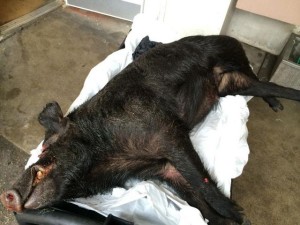Ashley Chaifetz, a PhD student studying public policy at UNC-Chapel Hill writes,
Marco Island, Florida police recently killed a wild boar running down a boardwalk towards beach as fearful beach-goers watched. In an effort to utilize the carcass for good, the dead boar was subsequently donated to the St. Matthews House, an organization that provides food and housing for those in need. Michael Braun of the News-Press writes that the dead boar was delivered and would be sent out for processing.
“When someone donates wild game we will try to use it to feed the residents,” he said, adding that donations of wild game or fish are made to the organization several times a year.
“People find different ways to donate,” Burns said. “When we get a donation we try to put it to good use.”
The pig will be sent to a local hog farmer who will then process the meat. Following the completion of all regulated inspections and preparation guidelines, Burns said, chefs with SMH Catering will use the meat as a meal option for shelter residents and Justin’s Place Recovery Program participants.
It is legal to hunt hog in Florida, as long as they are killed humanely. They can be found in all 67 counties. Wild hogs can carry Brucella and Salmonella amongst other pathogens – all of which can be addressed by paying attention in carcass/meat handling and cooking. Eating an undercooked hog or boar (or dressing it without gloves) increases risk of a brucellosis infection. Since the volunteers at St. Matthew’s house aren’t likely trained in processing or meat hygiene, sending the carcass out for expert attention is a good idea.
